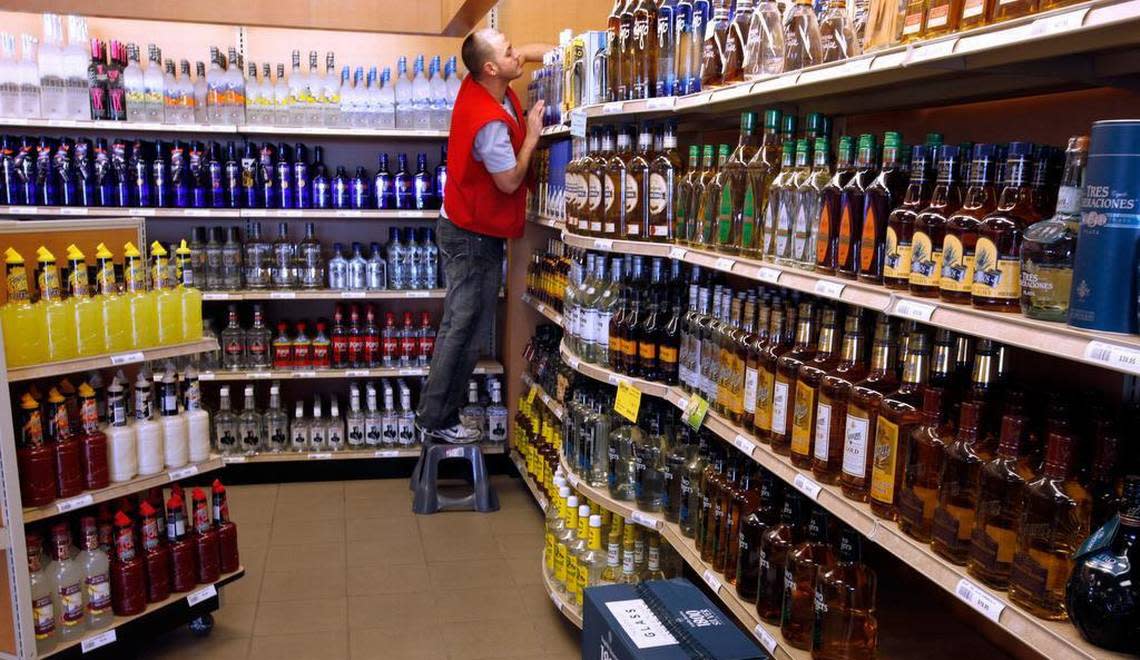Why can’t we buy liquor in NC grocery stores? A short history of ABC & booze laws.
If you’re new to North Carolina, or maybe just new to buying alcohol, your first attempt to buy hard liquor or spirits might have left you confused.
That’s because, unlike beer and wine, liquor can’t be sold in regular grocery stores in North Carolina.
Instead, the sale of liquor is controlled by the state, through the state government’s Alcoholic Beverage Control (ABC) Commission. The commission oversees wholesales of liquor, while local boards at the county and municipal levels run ABC stores that sell liquor to the public. (Liquor can also be sold on-site at distilleries — more on that later.)
“Alcohol is not an ordinary commodity and liquor is different from beer or wine,” says the North Carolina Association of ABC Boards, a group that represents local ABC boards.
(More than a third of U.S. states do allow hard liquor to be sold in grocery stores.)
“Alcohol can be an addictive product and abused by some. A control system limits the physical and social damage that can be caused by the misuse of liquor and reduces the costs borne by citizens that result from abusive or irresponsible consumption of liquor.”
But exactly why — and how — does the state’s liquor system operate like it does? We’re here to provide answers as part of The News & Observer’s Asked & Answered series, which answers questions we receive from readers, our newsroom and our community.
Here’s a quick history and civics lesson about liquor sales in North Carolina.
Why is liquor sold by ABC stores in NC?
The reasoning behind North Carolina’s liquor sales laws dates back to the late 19th and early 20th centuries, and largely stems from the temperance and prohibition movements of that time.
▪ The prohibition movement was active in North Carolina as early as 1852, when “a petition seeking prohibition was presented to the General Assembly, but no legislative action was taken,” according to NCpedia, an online encyclopedia about North Carolina.
▪ In 1907, about a year before North Carolina banned alcohol, temperance crusader Carrie Nation came to the state and spoke against alcohol, saying Salisbury “was second only to Chicago as ’the whiskeyest-soaked city in the United States,’” The N&O previously reported. Nation had previously visited Asheville in 1902 as part of a speaking tour.
North Carolina in 1908 voted by statewide referendum to ban alcohol, and statewide Prohibition went into effect in 1909 — more than a decade before the United States entered nationwide Prohibition in 1920.
Nationwide Prohibition ended in 1933, with the passage of the 21st Amendment to the U.S. Constitution. But North Carolina didn’t ratify the amendment, according to Digital NC, a blog run by the North Carolina Digital Heritage Center.
▪ NCpedia says that “’light’ wine and beer sales were allowed” in the state after nationwide Prohibition ended, but it would take a few more years before the sale of liquor became legal in the state, under the Alcohol Beverage Control (ABC) system.
The North Carolina General Assembly established the ABC system under law in 1937.
▪ The law “is intended to establish a uniform system of control over the sale, purchase, transportation, manufacture, consumption, and possession of alcoholic beverages in North Carolina, and to provide procedures to insure the proper administration of the ABC laws under a uniform system throughout the State.”

What powers does the NC ABC Commission have?
The 1937 law established the state ABC Commission, which “is an independent state agency housed in the NC Department of Public Safety with a direct report to the Governor’s Office” and serves as the “chief regulator for all alcoholic beverages in the state.”
The commission consists of a chairman and two associate members, all appointed by the governor.
The commission oversees the wholesale of liquor in the state, handling the administration of the state-owned liquor warehouse — but the commission does not operate ABC stores or sell liquor directly to the public. Instead, ABC stores, where the public can purchase liquor, are operated at the local level, by local ABC boards.
“In North Carolina, the sale of beer/wine/mixed drinks is legal only in jurisdictions that have voted in favor of it, and county/municipal boards operate the retail stores that sell bottles of spirituous liquor,” the state ABC Commission’s website says.
What do local ABC boards do in NC?
Local ABC boards are not part of the state ABC Commission, but are instead “local political subdivisions of the State.”
“They operate as separate entities establishing their own policies and procedures,” the state commission’s website says.
Local ABC boards — which consist of a chairman and between two to six members, all appointed by local government authorities — operate and manage the local ABC stores within their jurisdiction.
Local ABC boards order liquor to sell in their stores from the state-owned warehouse, which is administered by the state ABC Commission and operated by a private contractor.
The price of liquor sold at ABC stores is uniform throughout the state. Any sale prices offered, such as monthly discounts, are also uniform.
There are more than 400 local ABC stores in the state. A searchable list of stores is available at abc.nc.gov/Search/ABCStoreLocator.
Can you buy liquor at distilleries in NC?
In addition to buying liquor at ABC stores, liquor may also be purchased at distilleries in the state where liquor is produced on-site — and, unlike local ABC stores, distilleries can sell liquor on Sundays.
Holders of distillery permits in the state may “sell spirituous liquor distilled or produced at the distillery in closed containers to visitors who tour the distillery for consumption off the premises,” according to state law.
Distilleries are at their own discretion of how long the tour is, the information covered in the tour and “other parameters,” and they are not required to keep records about the tours.
